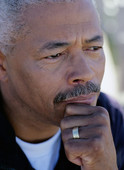More than half have depression or depressive symptoms; 25 percent taking antidepressants
WEDNESDAY, July 8, 2015 (HealthDay News) — Men with borderline testosterone levels frequently have depression and depressive symptoms, according to a study published online June 30 in the Journal of Sexual Medicine.
Christopher J. Westley, from The George Washington University in Washington, D.C., and colleagues examined whether men referred for borderline testosterone levels have higher rates of depression and depressive symptoms. Data were included for 200 adult men (mean age, 48 years) referred for borderline testosterone levels between 200 and 350 ng/dL. The main outcome was a combination of known depression, current antidepressant use, and/or depressive symptoms according to the Patient Health Questionnaire 9 (PHQ-9).
The researchers found that 56 percent of subjects had depression and/or depressive symptoms, significantly higher than rates of 6 to 23 percent seen in the general population (PHQ-9 scores ≥10). Twenty-five percent of subjects used antidepressants. High rates of overweight/obesity and physical inactivity were seen in the population. Erectile dysfunction, decreased libido, fewer morning erections, low energy, and sleep disturbances were common symptoms.
“While sexual and nonspecific symptoms (i.e., fatigue) likely prompted measurements of testosterone in this selected population, clinicians should recognize the high rates of depression and depressive symptoms in men referred for borderline testosterone levels,” the authors write. “Clinicians should consider screening for depression/depressive symptoms and overweight and unhealthy lifestyle risk factors in men referred for tertiary care for potential hypogonadism.”
Copyright © 2015 HealthDay. All rights reserved.








